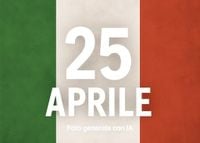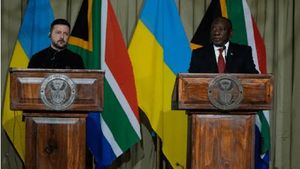April 25, 2025, marks a significant milestone in Italian history as the country commemorates the 80th anniversary of Liberation Day, a day dedicated to remembering the end of fascism and Nazi occupation. Celebrated annually, this date not only honors the historical events of April 25, 1945, when the National Liberation Committee for Upper Italy proclaimed a general insurrection against Nazi and fascist troops, but also serves as a poignant reminder of the sacrifices made by those who fought for freedom.
This year, the celebrations have taken on a somber tone due to the national mourning declared after the death of Pope Francis. Many cities across Italy have opted to suspend or reduce public manifestations, yet the spirit of the day remains alive through various online expressions of remembrance and solidarity.
As Italians take to social media to share messages of hope and remembrance, a collection of images, quotes, and poems has been curated for individuals to send to friends and family via platforms such as WhatsApp and Facebook. This practice not only reinforces emotional bonds but also highlights the importance of collective memory in a world that often seems indifferent to the past.
Among the moving quotes shared this year is one from Liliana Segre, who stated, "Cultivating Memory is still a precious vaccine against indifference and helps us, in a world so full of injustices and suffering, to remember that each of us has a conscience and can use it." Such reflections remind us of the ongoing relevance of the values fought for during the Resistance.
Giuseppe Ungaretti’s poignant words also resonate deeply: "Here live forever the eyes that were closed to the light so that everyone would have them open forever to the light" (For the dead of the Resistance). This sentiment encapsulates the sacrifices made by countless individuals during the dark days of fascism.
Furthermore, Cesare Pavese’s reflection, "You do not know the hills where blood has been shed. We all fled, we all threw away our weapons and our names," serves as a stark reminder of the personal costs of war and the struggle for liberation.
On this day, Italians also reflect on the significance of the song "Bella Ciao," an anthem of the anti-fascist movement that emerged from the Emilian Apennines and became synonymous with the struggle for freedom. This song continues to inspire generations, symbolizing the enduring spirit of resistance.
As part of the commemorations, various events are organized across the country, including parades, official speeches, and cultural activities that engage communities in honoring the legacy of the Resistance. Schools and institutions play a vital role in educating younger generations about the importance of freedom and the history of their nation.
In addition to public events, many individuals choose to send personalized "Buongiorno" messages that encapsulate the spirit of Liberation Day. These messages often include phrases such as, "Today we remember with pride the freedom conquered thanks to the courage and sacrifice of those who fought for a better Italy," and "May this day always remind us how precious the freedom we live is." Such sentiments foster a sense of unity and reflection among friends and family.
In a world increasingly connected through technology, the act of sending a simple greeting transcends mere formality; it becomes an opportunity to reinforce social ties and express gratitude for the freedoms enjoyed today. Maria Cervi’s words resonate in this context: "No conquest is forever: there is always someone who is interested in taking it away. So resisting is not only a duty, but it is also a necessity for the young people of today, otherwise we will not move forward." This call to action is particularly relevant as the younger generation navigates the complexities of modern society.
As the day unfolds, images and GIFs celebrating Liberation Day flood social media feeds, serving as visual reminders of the importance of this historical moment. These digital expressions not only commemorate the past but also inspire hope for a future rooted in justice and equality.
In 1949, the Italian government officially established April 25 as a national holiday, recognizing the significance of the events that transpired in 1945. This date symbolizes the culmination of years of struggle and sacrifice, marking the end of fascist rule and the restoration of democracy in Italy. Sandro Pertini, a prominent figure in the Resistance, famously proclaimed a general strike against the German occupation on April 25, 1945, calling upon citizens to rise in defense of their homeland.
The liberation of the entire peninsula did not occur overnight; it took several days for all regions to be freed from fascist control. Mussolini’s capture and execution on April 28, 1945, marked the definitive end of his regime, further solidifying the significance of Liberation Day as a moment of triumph over tyranny.
As Italy reflects on this important anniversary, it is crucial to recognize the diverse voices that contributed to the Resistance. Nilde Iotti noted, "The Resistance was an extraordinary event. It had achieved a truly exceptional unity that ranged from Badoglio officers to communist workers." This unity is a testament to the collective effort that led to liberation and serves as a model for contemporary movements advocating for social justice.
As the celebrations continue, the message remains clear: the fight for freedom and democracy is ongoing. Enzo Biagi encapsulated this sentiment well, stating, "April 25. A date that is an essential part of our history: it is also why we can feel free today. A certain Resistance is never over." This enduring legacy challenges each generation to uphold the values of liberty and justice.
In conclusion, April 25 is not just a date on the calendar; it is a powerful reminder of the sacrifices made for freedom and the ongoing responsibility to protect and cherish it. As Italians commemorate Liberation Day, they are called to reflect on their history, honor those who fought for their rights, and continue the pursuit of a just and equitable society for all.






